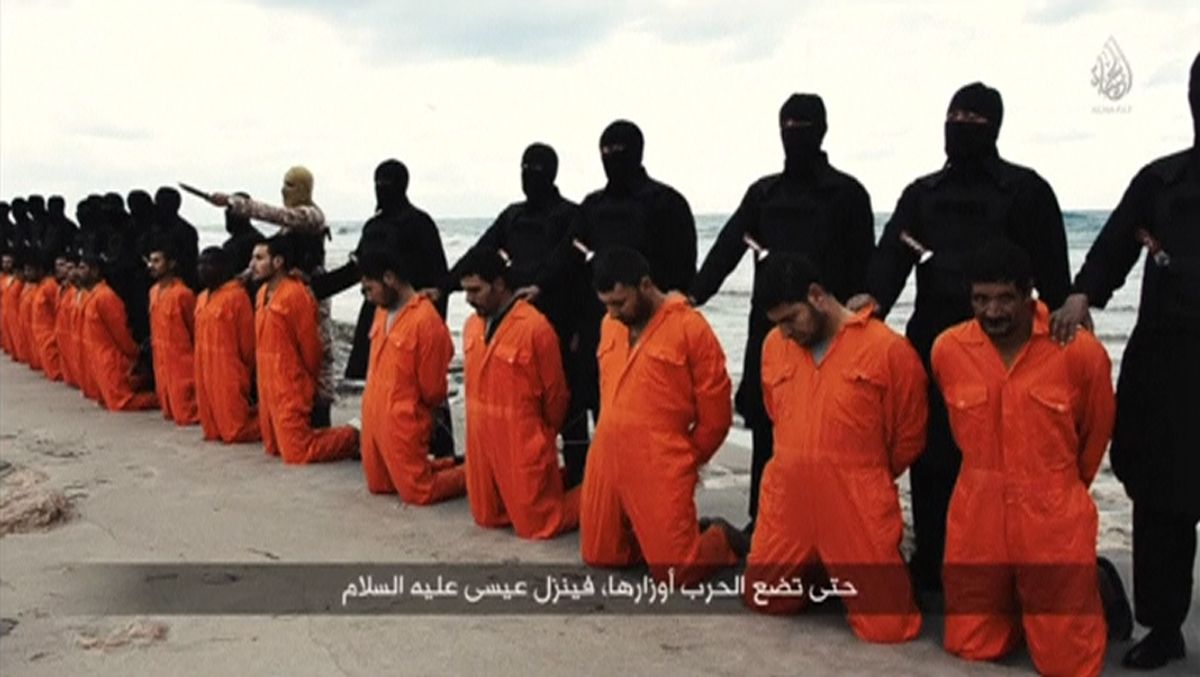
In the months following the creation of the Islamic State militant group's so-called caliphate in June 2014, affiliates began to spring up around the world in countries such as Algeria, Pakistan, the Philippines and Sudan.
These were groups who sought to bandwagon on the radical Islamist group's brand of jihad, but ISIS leadership actively sought to build a presence in a third country outside of Iraq and Syria: Libya.
The North African state now represents ISIS's largest power center outside of the caliphate's borders, with one city under its brutal brand of Islamic law and thousands of fighters across the country.
ISIS emerged against a background of lawlessness and instability in the country after the NATO-backed ousting of Colonel Muammar el-Qaddafi at the height of the Arab Spring in October 2011. In his place, rival militias battled for dominance in the country and the power vacuum allowed extremist groups such as the Al-Qaeda-linked Ansar al-Sharia to flourish.
Rival governments were created in the east and west of the country. The internationally recognized House of Representatives (HoR) had to relocate from the capital Tripoli to the eastern coastal city of Tobruk for security reasons after Islamist militant attacks. This parliament has the support of the Libyan army, Egypt and the United Arab Emirates. Replacing the HoR in Tripoli by August 2014 was the General National Congress, a rival Islamist government formed by figures who failed to win in the country's June 2014 elections.
By this time, ISIS had already declared its caliphate in Iraq and Syria. The same month—June 2014—the radical Islamic Youth Shura Council in the eastern city of Derna, a notorious hotbed of extremism, released a statement aligning itself to ISIS. "It is incumbent on us to support this oppressed Islamic State that is taken as an enemy by those near and those far, among the infidels or the hypocrites, or those with dead souls alike," it read. The group officially pledged allegiance to ISIS that October, declaring the creation of Wilyat Barqa (province of Barqa) in eastern Libya, an "Islamic emirate" and therefore an extension of the Iraqi-Syrian caliphate. The pledge of allegiance refers to the historic name given to eastern Libya, Barqa, after Islamic armies conquered the ancient region of Cyrenaica in AD642.
ISIS announced its presence in Derna with a parade of vehicles, laden with its black flags, through the city. But this ISIS branch was different to the group's other affiliates created around the world. ISIS caliph Abu Bakr al-Baghdadi had dispatched a key aide, Iraqi national Abu Nabil al-Anbari, to oversee the affiliate's creation and some 300 Libyan nationals returned from fighting for the group in Iraq and Syria to boost its presence in the country.
Before this, ISIS caliph Abu Bakr al-Baghdadi dispatched a key aide, Yemeni national Abu Nabil al-Anbari, to oversee the affiliate's creation while, late last year, the eastern Libyan faction were buttressed by the arrival of at least 300 Libyan nationals, who had been fighting for the terror group in Iraq.The group proceeded to set up training camps for foreign fighters—predominantly Algerians, Egyptians, Sudanese, Saudis and Tunisians—on the outskirts of Derna and the western city of Sabratha as well as establishing a presence in the eastern city of Benghazi. The country's porous borders allowed jihadis to easily enter Libyan territory from neighboring Tunisia as well as from the south and the east. In January 2015, it launched its first major attack in the country, killing 10 people in a car bomb and shooting attack at the Corinthia Hotel in Tripoli.
As 2015 progressed, international efforts to form a unity government and bring stability to the country continued to falter due to differences between the two warring power rivals in the east and the west. ISIS continued to use this to strengthen its presence in Derna, establishing strict Islamic law and carrying out beheadings, crucifixions and public executions. They began to expand into central Libya, where the country's lucrative oil fields are located.

ISIS propaganda, in similar fashion to the videos released from Iraq and Syria, began to emanate from Libya. The group captured 21 Egyptian Coptic Christians in Sirte and released a video showing the beheading of all of the hostages along the Mediterranean coast in February 2015. In April, the group again released an execution video showing the shooting and beheading of at least 30 Ethiopian Christians, again on the North African coastline.
In its attempts to expand in the country, however, a rival militia in Derna, the Al-Qaeda-linked Abu Salim Martyrs Brigade, pushed ISIS out of Derna and into the country's eastern mountains in June 2015. The clashes came after ISIS killed a senior member of the city's Shura Council, which has close links to the Al-Qaeda militia.
Still, in the same month, the group captured the former hometown of el-Qaddafi, the central coastal city of Sirte where they have been met by less resistance. The group's fighters initially captured Sirte airport in May 2015 before seizing full control of the city from the Libya Dawn militia allied to the GNC. This represented ISIS's first capture of an entire Libyan city and it proceeded to impose its radical Islamist ideals across the city after crushing a rebellion by residents. The group hung bodies from lampposts in Sirte and carried out public executions in a bid to strike fear into locals.
Despite losing Derna, ISIS has since attempted to take over Sabratha, beheading a dozen members of the local security forces but ultimately failing when met by resistance. It still maintains control of Sirte, establishing checkpoints to restrict the movement of people in and out of the city as both external and internal pressure mounts on the group.
As the U.S.-led coalition, the Russian air force, the Syrian army and Kurdish fighters exact defeats on ISIS across Iraq and Syria, it has used Libya as a retreat for its leadership and its fighters, with the continued instability providing a safe haven on the ground. U.S. estimates now put the total number of ISIS fighters in Libya at a maximum of 6,000, almost double previous estimates.
This growth has seen a shift in Western policy against the radical Islamist group to include Libya in military action. French, U.S. and British special forces have all been reported to have a covert presence inside Libya in a bid to prepare forces for the moment that a unity government is potentially formed in the country.
France has conducted aerial surveillance missions in Libya and the U.S. has initiated an airstrike campaign against ISIS's top leaders in the country. Washington killed al-Anbari, the group's leader there, in a strike outside of Derna in November 2015 and, in a February 2016 strike on the group's training camp near Sabratha, killed the senior ISIS militant, Noureddine Chouchane, believed to have orchestrated the Sousse beach massacre the year before.
On Monday, the Libyan parliament postponed a vote of confidence in a new U.N.-backed unity government but the European Union has offered its support for the new body and U.K. Defense Minister Philip Hammond paid a rare visit to Tripoli to pledge $14 million (£10 million) to the new body. When Libya's political elite becomes united, Western involvement is expected to dramatically increase and therefore the pace of ISIS's rise in the country looks set to slow.
Uncommon Knowledge
Newsweek is committed to challenging conventional wisdom and finding connections in the search for common ground.
Newsweek is committed to challenging conventional wisdom and finding connections in the search for common ground.
About the writer
Jack is International Security and Terrorism Correspondent for Newsweek.
Email: j.moore@newsweek.com
Encrypted email: jfxm@protonmail.com
Available on Whatsapp, Signal, Wickr, Telegram, Viber.
Twitter: @JFXM
Instagram: Read more
To read how Newsweek uses AI as a newsroom tool, Click here.





